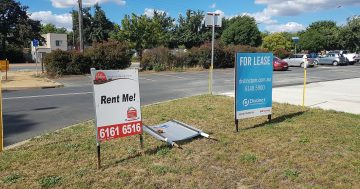
Jo Clay MLA says there’s a need for urgent action to make rentals more affordable in Canberra. Photo: Michelle Kroll.
Canberrans are anxious about the cost of living. It’s an inequality crisis impacting some Canberrans much worse than others.
They’re frightened of being evicted. They’re scared of landlords increasing their rent. They fear one more rent increase will send them over the edge.
It’s understandable. It’s never cost so much to live, and rents have never been higher.
Many people are worried they might do something that might irritate their landlord, even if it’s simple repairs and they’re within their rights. People are frightened that if they lose their current rental, they’ll have to compete for a new rental at much higher prices. They’re worried they’ll be homeless.
We need a rent freeze.
I’ve lived in Canberra my whole life. Belconnen was always the affordable place to live. I lived in share houses in Hawker, Aranda and Cook in the 2000s and we paid between $200 and $330 per week between us.
Median rents in Belconnen are now $565 per week. Around Canberra, the average rental is a jaw-dropping $750 a week. If you haven’t seen a raise in your paycheck in years, this is nowhere near affordable. If you’re on Jobseeker, the Aged Pension or Youth Allowance, there is not a single property affordable for you to rent.
My partner and I bought our home in Macquarie for $368,000. The same house sold for $118,000 the decade before and we paid a big price rise in those eight years, but we could easily afford it on one full-time and one part-time salary. Median house prices in Belconnen are now around $890,000.
Young people can’t afford to buy a home, so renting is not something they’ll do for a little while before saving a deposit. Renting is their long-term option and, as it stands, it’s a bad one.
But it doesn’t have to be that way.
Renters should be able to have a safe, secure and affordable home. Renting can give you freedom to move and greater flexibility than when you own your house.
The ACT Greens have long been the party for renters.
Just last year, my colleague Shane Rattenbury, Greens leader and Attorney-General, ended no-cause evictions, banned solicited rent bidding and brought in some basic standards like insulation. He also published the Tenant’s Rights Handbook, among other important reforms.
It’s great progress, but it’s not yet enough to make renting fair, affordable and secure. That’s why I’m bringing a bill to improve our existing rent controls and make renting more affordable.
People can only stretch their budget so far before they have to start cutting back on meals, doctor’s visits and heating or cooling their homes. More people are slipping into precarity and poverty. The private rental market is failing. This, of course, means we need more investment in public housing.
But we also need to freeze rent increases.
We already have rent caps, which limit increases to 110 per cent of the Consumer Price Index (CPI). But this isn’t enough. ACT rents have increased significantly more in the last few years than in the decade before the COVID-19 pandemic.
As your groceries and medical care go up, you can’t afford a rent increase at the same time. The Greens want to freeze rent increases completely for two years to give everyone some relief and then cap rent increases at a flat 2 per cent rate of existing rent.
We also want to stop big rent increases between leases and stop rent bidding.
Rental market analysis from the Reserve Bank of Australia shows that the majority of new tenants pay higher rent than what was charged for the same property one year prior and properties with new tenants have larger rent increases than those with existing tenants.
Current laws allow this. Between leases, the 110 per cent limit doesn’t apply. A rent increase at that point is negotiated by tenant and landlord. Landlords can also write clauses into a tenancy agreement that override the 110 per cent limit. And when a property is vacated and re-advertised for rent, landlords can set the asking price at whatever they choose.
Our bill will change this. Rent increases will be tied to the property, not to a specific tenant or tenancy agreement. This will put more downward pressure on rental prices and stop price hikes when a property is advertised for rent.
I’m tabling this bill in the first sitting week this year because Canberra renters urgently need our help. For too long, their needs have been overshadowed by the wants of property investors. Everybody deserves an affordable home.
Jo Clay MLA is a Member for Ginninderra.





















